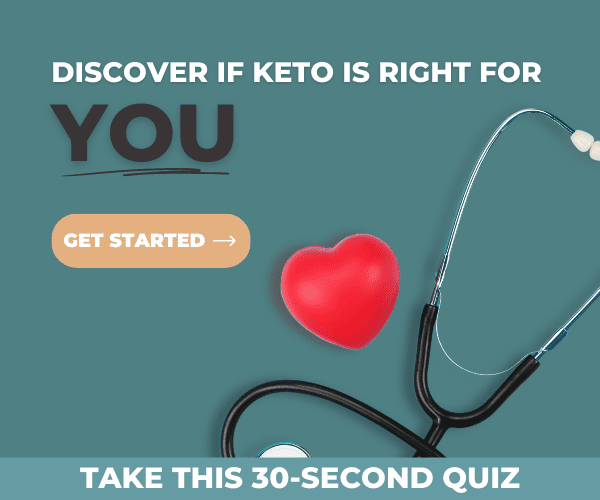Vitamins to Avoid on Keto: Stay Away from These Supplement Ingredients

If you’re living the keto lifestyle or thinking about switching to keto, you probably know that the keto diet limits your intake of carbohydrates to 50 grams or less per day. Since you’re removing some foods from your diet that contain nutrients, such as grains, starchy vegetables, and many fruits, make sure to eat a wide variety of keto foods so you won’t miss out on important vitamins.
Some people may find it helpful to supplement with vitamins at the start of their keto diet journey until they become more acquainted with this way of eating. If this is you, then supplementing can help you succeed.
Here’s why you should pay attention to your vitamin needs on keto, what to look out for when choosing a vitamin supplement, and what vitamins to avoid on keto.
The Importance of Vitamins on the Keto Diet
Vitamins are organic substances that enable your body to work as it should. Some vitamins help with energy production while others boost your immunity and contribute to muscle and nerve function. Vitamins (and minerals or electrolytes, to a greater degree) may also help manage keto flu symptoms.
What vitamins should you take when on keto?
- Vitamin A: Found in salmon and organ meats, vitamin A promotes normal vision and ensures proper heart development in embryos. [1]
- Vitamin C: Also known as ascorbic acid, vitamin C helps with collagen production, wound healing, iron absorption, and immune function. [2]
- Vitamin E: Aside from reducing the effects of UV light on the skin, vitamin E boosts the function of your immune system. [3]
- B Vitamins: Vitamin B7 (biotin) is one of the best vitamins to take on keto for hair loss. [4] Others include B6, B9, and B12, which improve mood, produce red blood cells, and keep your nerves healthy.
- Vitamin D: This vitamin helps your body absorb calcium, one of the electrolytes that you want to make sure you’re getting enough of on the keto diet. [5]
- Vitamin K: Found in green vegetables, meat, cheese, and eggs, vitamin K is necessary for blood clotting and bone health. [6]
Certain people are more likely to benefit from supplements like multivitamins, including children and teens, older individuals, people with certain health conditions, and those who lack access to a variety of fresh keto foods.
Vitamins to Avoid on Keto
Vitamins from natural whole keto foods are always better absorbed by your body than vitamins in supplement form. However, if supplementing is necessary in your case, watch out for these fillers and excipients found in many synthetic vitamins.

Vitamins with titanium dioxide
Titanium dioxide is a popular pigment used to enhance the white color and opacity of foods and over-the-counter products. These include toothpaste, coffee creamers, edible ice, breakfast cereals, soups, and many dietary supplements. [7]
There is a concern regarding the risk of titanium dioxide to be a carcinogen. Although the International Agency for Research on Cancer (IARC) concludes that there isn’t enough evidence to show that titanium dioxide particles cause cancer in humans, the opposite is true in experimental animals. This is why the IARC classifies titanium dioxide as a Group 2B carcinogen—meaning, it’s “possibly carcinogenic to humans.” [8]
Vitamins with artificial food dyes
Synthetic color additives or food dyes are commonly used in over-the-counter and prescription drugs to enhance their appearance, provide brand identity, and make them more pleasing to customers in order to increase purchases.
Currently approved Food, Drug, & Cosmetic (FD&C) dyes include:
- Yellow No. 5 (Tartrazine)
- Yellow No. 6 (Sunset Yellow)
- Red No. 40 (Allura Red)
- Blue No. 2 (Indigo Carmine)
- Blue No. 1 (Brilliant Blue)
- Green No. 3 (Fast Green)
- Red No. 3 (Erythrosine)
However, the safety of these dyes has always been a topic of debate as some studies have linked them to health problems like allergies, hyperactive behavior in children, and tumors.
The Center for Science in the Public Interest published a document that summarizes studies on food dyes performed on animal subjects. You can read the full document here or check out some of the findings from the document below:
- Blue No. 1: Allergic reactions, one abstract study reported kidney tumors in mice
- Blue No. 2: Possible brain and bladder tumors in rats
- Green No. 3: Possible bladder and other tumors in rats
- Red No. 40: Allergic reactions, with p-Cresidine as a cancer-causing contaminant. [9]
- Yellow No. 5 and 6: Allergic reactions, with Benzidine as a cancer-causing contaminant. [10]
Here are more research findings on humans:
- One clinical trial done in preschool children found that eliminating artificial colorings from their diet resulted in significant reductions in their hyperactive behavior. [11]
- A 21-day study showed that tartrazine dye, known as lemon yellow, caused irritability, restlessness, and sleep disturbance in children with suspected hyperactivity. Furthermore, the effects were more pronounced when a higher dosage of the dye was given. [12]
- In an older study, patients with chronic urticaria (an allergic skin condition) were placed on a diet that removed all color additives and preservatives. They were then given capsules containing tartrazine dye. Results showed that 34% of the patients showed improvements on the diet without artificial colors. Meanwhile, 8% of those with chronic urticaria and 20% of those with aspirin intolerance showed tartrazine sensitivity. [13]
Vitamins with added sugars
It’s no secret that too much sugar in your diet causes weight gain, inflammation, insulin resistance, and chronic health conditions. In fact, hidden sugars in supplements could be preventing you from entering ketosis and reaching your health goals.
Gummy vitamins are more likely to contain added sugars, which makes them taste very sweet. Check the ingredients list for common names of sugar, such as glucose, dextrose, fructose, fruit juice concentrate, and corn syrup. [14]
Tip: Product ingredients are listed from the highest to the lowest amount. So, if you find sugar listed as one of the first three ingredients, it means that your gummy vitamin is full of sugar and it’s best to avoid it.
There’s No Substitute for a Healthy Keto Diet

At the end of the day, a well-rounded keto diet that includes a variety of different whole, unprocessed foods will always beat even the best diet supplements. As a rule of thumb, use supplements only to address deficiencies or prevent them when first starting a keto diet.
Taking a supplement can be beneficial in such cases. However, you should also carefully consider the product you’re buying to ensure that it’s free from harmful ingredients. You’ll be better off avoiding vitamins containing titanium dioxide, artificial dyes, and added sugars.
We encourage you to follow a varied keto diet that limits processed foods. This will help you get all the vitamins and minerals for your body to thrive. You can get started by checking out Ketogenic.com’s meal plans and keto recipes.
References
National Institutes of Health Office of Dietary Supplements. Vitamin A and Carotenoids - Fact Sheet for Consumers (nih.gov)
National Institutes of Health Office of Dietary Supplements. Vitamin C - Fact Sheet for Consumers (nih.gov)
National Institutes of Health Office of Dietary Supplements. Vitamin E - Fact Sheet for Consumers (nih.gov)
Zempleni, J., Hassan, Y. I., & Wijeratne, S. S. (2008). Biotin and biotinidase deficiency. Expert review of endocrinology & metabolism, 3(6), 715–724. https://doi.org/10.1586/17446651.3.6.715
National Institutes of Health Office of Dietary Supplements. Vitamin D - Fact Sheet for Consumers (nih.gov)
National Institutes of Health Office of Dietary Supplements. Vitamin K - Fact Sheet for Consumers (nih.gov)
Winkler, H. C., Notter, T., Meyer, U., & Naegeli, H. (2018). Critical review of the safety assessment of titanium dioxide additives in food. Journal of nanobiotechnology, 16(1), 51. https://doi.org/10.1186/s12951-018-0376-8
IUPAC Glossary of Terms Used in Toxicology Classification of carcinogenicity. Standard IARC classification. (https://ec.europa.eu/)
OEHHA. p-Cresidine. p-Cresidine (oehha.ca.gov)
National Institutes of Health National Cancer Institute. Benzidine. Benzidine (cancer.gov)
Bateman, B., Warner, J. O., Hutchinson, E., Dean, T., Rowlandson, P., Gant, C., Grundy, J., Fitzgerald, C., & Stevenson, J. (2004). The effects of a double blind, placebo controlled, artificial food colourings and benzoate preservative challenge on hyperactivity in a general population sample of preschool children. Archives of disease in childhood, 89(6), 506–511. https://doi.org/10.1136/adc.2003.031435
Rowe, K. S., & Rowe, K. J. (1994). Synthetic food coloring and behavior: a dose response effect in a double-blind, placebo-controlled, repeated-measures study. The Journal of pediatrics, 125(5 Pt 1), 691–698. https://doi.org/10.1016/s0022-3476(94)70059-1
Settipane, G. A., Chafee, F. H., Postman, I. M., Levine, M. I., Saker, J. H., Barrick, R. H., Nicholas, S. S., Schwartz, H. J., Honsinger, R. W., & Klein, D. E. (1976). Significance of tartrazine sensitivity in chronic urticaria of unknown etiology. The Journal of allergy and clinical immunology, 57(6), 541–546. https://doi.org/10.1016/0091-6749(76)90004-x
Barnwell, Anna. (2018). Secret Sugars: The 56 Different Names for Sugar. Virta Health. (virtahealth.com)









